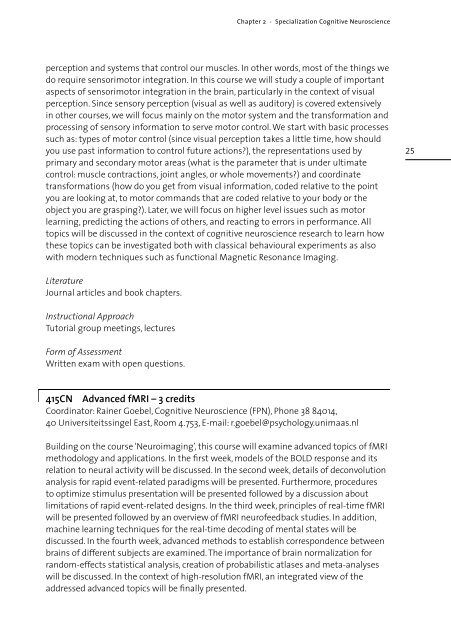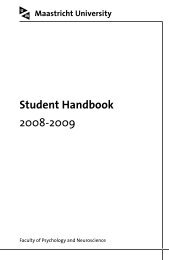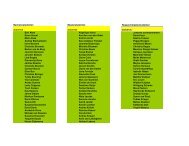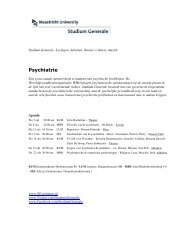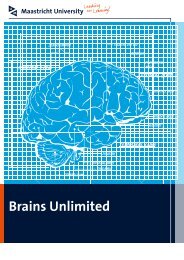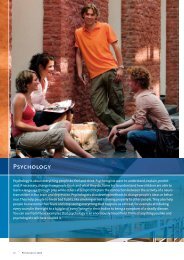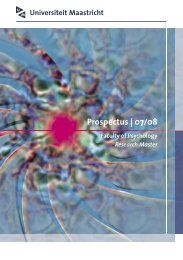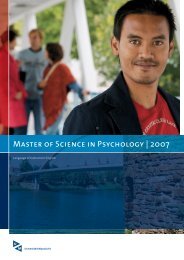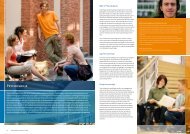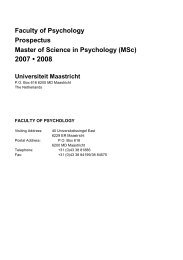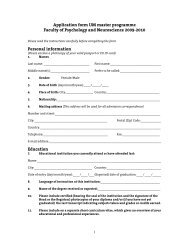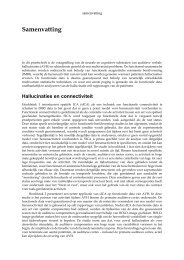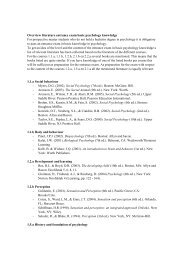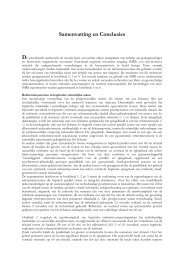Prospectus | 08/09 - Psychology and Neuroscience - Maastricht ...
Prospectus | 08/09 - Psychology and Neuroscience - Maastricht ...
Prospectus | 08/09 - Psychology and Neuroscience - Maastricht ...
You also want an ePaper? Increase the reach of your titles
YUMPU automatically turns print PDFs into web optimized ePapers that Google loves.
Chapter 2 - Specialization Cognitive <strong>Neuroscience</strong><br />
perception <strong>and</strong> systems that control our muscles. In other words, most of the things we<br />
do require sensorimotor integration. In this course we will study a couple of important<br />
aspects of sensorimotor integration in the brain, particularly in the context of visual<br />
perception. Since sensory perception (visual as well as auditory) is covered extensively<br />
in other courses, we will focus mainly on the motor system <strong>and</strong> the transformation <strong>and</strong><br />
processing of sensory information to serve motor control. We start with basic processes<br />
such as: types of motor control (since visual perception takes a little time, how should<br />
you use past information to control future actions?), the representations used by<br />
primary <strong>and</strong> secondary motor areas (what is the parameter that is under ultimate<br />
control: muscle contractions, joint angles, or whole movements?) <strong>and</strong> coordinate<br />
transformations (how do you get from visual information, coded relative to the point<br />
you are looking at, to motor comm<strong>and</strong>s that are coded relative to your body or the<br />
object you are grasping?). Later, we will focus on higher level issues such as motor<br />
learning, predicting the actions of others, <strong>and</strong> reacting to errors in performance. All<br />
topics will be discussed in the context of cognitive neuroscience research to learn how<br />
these topics can be investigated both with classical behavioural experiments as also<br />
with modern techniques such as functional Magnetic Resonance Imaging.<br />
25<br />
Literature<br />
Journal articles <strong>and</strong> book chapters.<br />
Instructional Approach<br />
Tutorial group meetings, lectures<br />
Form of Assessment<br />
Written exam with open questions.<br />
| 415CN Advanced fMRI – 3 credits<br />
Coordinator: Rainer Goebel, Cognitive <strong>Neuroscience</strong> (FPN), Phone 38 84014,<br />
40 Universiteitssingel East, Room 4.753, E-mail: r.goebel@psychology.unimaas.nl<br />
Building on the course ‘Neuroimaging’, this course will examine advanced topics of fMRI<br />
methodology <strong>and</strong> applications. In the first week, models of the BOLD response <strong>and</strong> its<br />
relation to neural activity will be discussed. In the second week, details of deconvolution<br />
analysis for rapid event-related paradigms will be presented. Furthermore, procedures<br />
to optimize stimulus presentation will be presented followed by a discussion about<br />
limitations of rapid event-related designs. In the third week, principles of real-time fMRI<br />
will be presented followed by an overview of fMRI neurofeedback studies. In addition,<br />
machine learning techniques for the real-time decoding of mental states will be<br />
discussed. In the fourth week, advanced methods to establish correspondence between<br />
brains of different subjects are examined. The importance of brain normalization for<br />
r<strong>and</strong>om-effects statistical analysis, creation of probabilistic atlases <strong>and</strong> meta-analyses<br />
will be discussed. In the context of high-resolution fMRI, an integrated view of the<br />
addressed advanced topics will be finally presented.


